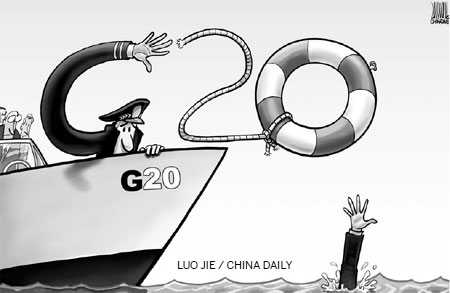Coordination essential
Updated: 2012-06-19 13:42
By Huang Wei (China Daily)
|
||||||||

With the global economy on the brink of another crisis the maturing G20 must once again rise to the challenge
Since its first summit in 2008, the gathering of the G20 nations has gradually moved center stage in global affairs in the post-crisis era. As fresh financial and trade challenges cut into people's confidence in economic recovery this year, many are hoping for significant breakthroughs among the fanfare in Mexico.
Yet domestic political demands, the acute European debt crisis and concerns about a future global economic downturn have cast a shadow over the possible coordination results of the two-day summit in Los Cabos. Moreover, it will have to overcome accusations that each member does things in its own way on major international issues, and answer questions about its representation and effectiveness.
Compared with the past six summits, Mexico's choice of topics at the summit reflects more of developing countries' concerns. Issues promoted by Mexico include structural reforms related to economic growth and employment promotion; reform of international financial institutions and improvement of the global financial framework; food and energy security; green growth and climate change issues related to sustainable development. The first three issues have been discussed and will continue to be promoted, while the discussion on sustainable development is the preference of Mexico.
In dealing with development issues, both developing countries and developed economies should establish a good coordination and communication mechanism among them and also maintain cooperation to achieve mutually beneficial results.
While promoting the growth of the global economy, the fairness of profits distribution should be guaranteed. Building an international environment featuring inclusive growth needs not only those policy options that promote growth, but also corresponding responsibility arrangements for development, and the international rules to regulate and achieve these goals.
With the strengthening of international economic relations, the interdependence of national economies is on the rise. The design and formulation of global rules should guarantee the participation and voice of developing countries. Two principles should be followed when formulating international rules. First, common but differentiated responsibility. International rules should have the flexibility to avoid developing countries from taking on excessive responsibilities or costs. Second, the rights should match the obligations. Countries that shoulder a greater obligation should be given corresponding rights, and the rights that lack corresponding duties or obligations should be limited.
Meanwhile, the summit will need to address the European debt crisis.
The Greek election result has reduced fears that Greece will exit the euro, but the ongoing crisis in the eurozone has put an additional burden on the Los Cabos summit. The continually fermenting crisis not only affects the European economy, it is also curbing global economic development. Taking into account the importance of the European economy in the global economy, the G20 summit will not be able to ignore the issue.
The G20 summit is a crisis-driven international economic coordination forum and it is because of the rapid and efficient cooperation promoted by leaders at the G20 summit in the early stages of the global financial crisis that recovery could be achieved so quickly. Therefore, with the global economy moving to the brink of a new crisis, the G20 must once again rise to the challenge.
With globalization, the economic performance or policy options of countries with systemic importance tend to have large spillover effects, so economic policy coordination at the multilateral level is an indispensable means of stabilizing the global economy. In terms of global governance, the G20 is the platform that best combines efficiency and representation. We look forward to the G20 gradually maturing, and becoming an important mechanism for global economic governance and global economic development.
The author is an associate research fellow with the Institute of World Economics and Politics, Chinese Academy of Social Sciences.

 Relief reaches isolated village
Relief reaches isolated village
 Rainfall poses new threats to quake-hit region
Rainfall poses new threats to quake-hit region
 Funerals begin for Boston bombing victims
Funerals begin for Boston bombing victims
 Quake takeaway from China's Air Force
Quake takeaway from China's Air Force
 Obama celebrates young inventors at science fair
Obama celebrates young inventors at science fair
 Earth Day marked around the world
Earth Day marked around the world
 Volunteer team helping students find sense of normalcy
Volunteer team helping students find sense of normalcy
 Ethnic groups quick to join rescue efforts
Ethnic groups quick to join rescue efforts
Most Viewed
Editor's Picks

|

|

|

|

|

|
Today's Top News
Health new priority for quake zone
Xi meets US top military officer
Japan's boats driven out of Diaoyu
China mulls online shopping legislation
Bird flu death toll rises to 22
Putin appoints new ambassador to China
Japanese ships blocked from Diaoyu Islands
Inspired by Guan, more Chinese pick up golf
US Weekly

|

|






